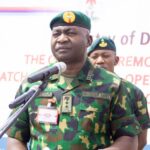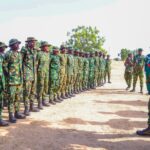By Augustine Ehikioya
With over 130,000 insurgents so far surrendering to the Armed Forces of Nigeria (AFN), the Chief of Defence Staff (CDS), General Christopher Musa, on Tuesday disclosed that there are currently 789 ex-combatants undergoing de-racialisation, re-acquisition, and reintegration back to the society.

According to him, Operation Safe Corridor (OPSC) was initiated to carry out the assignment in response to increasing surrendering of the insurgents.
He spoke while declaring open a meeting of stakeholders of Operation Safe Corridor in Abuja. It was monitored by Security Watch Africa (SWA).
The stakeholders meeting was to work out modalities for the transfer of rehabilitated clients to their National and State Governments.
Represented by the Chief of Policy and Plans, Air Vice Marshal Sayo Olatunde, Gen Musa said “As you are aware, Operation Safe Corridor was initiated due to the marvellous surrender of Boko Haram and Islamic State of West Africa pro-peace members, induced by well-coordinated operations by all stakeholders.
“This has led to over 130,000 insurgents and their family members surrendering since the inception of the program. Consequently, we currently have a total of 789 ex-combatants undergoing the re-racialization, re-acquisition, and re-integration program under the initiative.
“Who are expected to graduate this year? To this meeting, I therefore say that conforming law with localities ensures the proper integration of the first of two parties, consisting of 381 clients in the United States.
“Considering the diverse perspectives of the committee members in this room, I have no doubt that all issues pertaining to the successful re-integration of these clients back into society will be exhaustively discussed with pragmatic solutions to be found.
“It is also important to mention that upon graduation from this scheme, each client will be provided with some personal items as well as start-up pacts based on the three acquired, including their families.”
Gen Musa added “This is to enable them to set up small businesses and start a new life. Accordingly, I urge benefiting state governments to facilitate the seamless re-integration of the ex-combatants by providing additional support to ease the transitional process.
“We are very optimistic that working closely with local and traditional authorities, the state can deploy security apparatus at their disposal to effectively track and monitor the progress of the re-integrated ex-combatants.”
Apart from forming a significant part of the activities aimed at successfully integrating rehabilitated clients, he said the meeting is to also provide a critical platform to reflect on collective effort concerning the re-radicalization initiative while assessing progress and strategizing against any anticipated challenges.
According to him, the meeting will go a long way in ensuring lasting peace in Nigeria.
He also commended the dedication of the committee towards ensuring the success of the Safe Corridor Initiative.
“I must state that your relentless efforts and commitment to ensuring national security are highly appreciated. The successes recorded so far are a testament to your resilience and commitment to duty. Despite the successes, we must remember that there is a lot more to be done.
“Hence, the importance of this stakeholder meeting. I therefore urge you, our distinguished partners, to approach this meeting with open minds, honesty, objectivity, and a determination to learn and innovate new ideas.
“Thus, we must engage in robust discussions, ask questions, and can then take action to form the most effective path for this valuable initiative.” he stated
Gen Musa expressed profound gratitude to President Bola Tinubu for his steady leadership and outstanding commitment and support to the Armed Forces and security agencies across the country.
He also thanked the implementation partners and friendly nations who have continued to provide technical support for the Operation Safe Corridor initiative.
Speaking earlier in his welcome address, Brigadier General Y, Coordinator Operation Safe Corridor, noted that OPSC is a multi-agency humanitarian scheme backed by extant provisions of the Constitution of the Federal Republic of Nigeria and International Humanitarian and Human Right Laws.
He said that the operation consists of personnel drawn from 17 Services, Ministries, Departments and Agencies.
“This unique composition presents a whole of government approach towards tackling the insurgency in the Northeast. In order to foster synergy and improve the capacity of personnel in-tandem with global best practices, OPSC in conjunction with its implementation partners conducts regular trainings in the form of seminars, workshops and strategic retreats.
“This perhaps explains why the activities of OPSC has continued to attract the attention of local and international researchers in the field of DRR.
He said since the commencement of the Programme in 2016, OPSC has successfully processed 2,190 clients comprising 2,163 Nigerians and 27 foreign nationals from Cameroon, Chad and Niger.
“All the foreign clients were transferred to their respective national authorities for reintegration. Between July and November 2024, a total of 825 clients were transferred to the DRR Camp to commence training.
“Amongst them are 14 foreigners from Burkina Faso, Cameroon, Chad and Niger. It is also important to mention that 22 clients were subsequently transferred to the Federal Neuro Psychiatric Hospital, Maiduguri for further evaluation and management.” he added.
He went on “Our purpose this morning, in line with the directive of the Chief of Defence Staff/National Chairman of OPSC, is to work out modalities for the smooth transfer of the clients presently in the camp to their national and states authorities for re-integration after graduation in March 2025.”
He expressed appreciation to the Chief of Defence Staff and other members of the National Steering Committee for their steadfastness and encouragement.
Some of those who attended the meeting are officials and representatives of the following state government, services, MDAs, and OPSC implementation partners:
Office of the National Security Adviser, Federal Ministry of Justice, Federal Ministry of Women Affairs and Social Development, Federal Ministry of Humanitarian Affairs and Disaster Management, Adamawa State, Akwa Ibom State, Bauchi State, Borno State, Cross River State, Edo State, Gombe State, Jigawa State.
Others are Kaduna State, Kano State, Katsina State, Kebbi State, Kogi State, Kwara State, Nasarawa State, Niger State, Osun State, Oyo State, Plateau State, Sokoto State, Taraba State, Yobe State, Zamfara States.
In attendance at the meeting included DHQ, Services HQ (AFN) and DIA, Nigeria Police Force (NPF), Department of State Services (DSS), National Intelligence Agency (NIA), Nigerian Correctional Services (NCoS), Nigerian Security and Civil Defence Corps (NSCDC), Nigerian Immigration Service (NIS), National Orientation Agency (NOA), National Emergency Management Agency (NEMA), National Drug Law Enforcement Agency (NDLEA), National Directorate of Employment (NDE), North East Development Commission (NEDC), National Identity Management Commission (NIMC), OPSC Implementation Partners (UNICEF, IOM, NERI and CDD), OPSC Advisory Committee.










